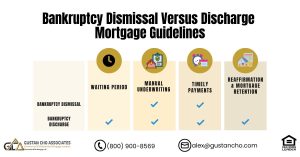This blog will cover preparing for home loan before applying for a mortgage for a smooth mortgage approval without stress. Preparing for home loan before entering a home purchase contract will minimize stress during the mortgage process for home buyers. The main reason for stress during the mortgage process and a last-minute mortgage denial is a borrower not being properly qualified. Preparing for home loan should start months before getting qualified. There are certain mistakes home buyers can avoid prior to and during the mortgage process. This blog will discuss preparing for home loan for homebuyers and mistakes to avoid before and during the mortgage underwriting process. There is no reason for a borrower to get a last-minute mortgage denial and stress during the mortgage underwriting process.
Tips on Preparing For Home Loan For a Smooth Mortgage Process
Borrowers rely on their loan officers and lenders to honor their pre-approvals. Homebuyers count on their lenders not just to close on their home purchase loan but to close them on time. A loan officer should work with borrowers in preparing for a home loan before issuing a pre-approval letter. Over 80% of our borrowers are either stressed during the mortgage process or got a last-minute mortgage denial due to not being properly qualified by a loan officer. This is not the borrower’s fault. It is the loan officer’s fault for issuing a pre-approval without fully and properly qualifying their borrowers.
What Would Make a Mortgage Underwriter Deny a Loan?
There are basic common mistakes to avoid during the mortgage process. These mistakes must be avoided for the mortgage process to proceed without delay. Mistakes can cost borrowers money, delay closings, hinder home loans or get borrowers denied for a mortgage. This article will cover the top mistakes home buyers need to avoid. Speak With Our Loan Officer for Mortgage Loans
How Much Can I Afford Versus How Much I Qualify
A loan officer will qualify borrowers on the maximum home they can qualify for versus how much they can afford. Nobody but the home buyer will know exactly how much they can afford. A loan officer is not going to know your personal finances. The following types of expenses are not used to qualify borrowers:
- Utilities
- Personal insurance such as medical, dental, vision, auto, life, and other insurance
- Child and Elderly Care Expenses
- Education Expenses
- Vacation
- Maintenance and repairs
- Groceries and food expenses
- Cell phone, internet, cable
- Entertainment
- Other personal expenses
The above expenses are not considered by lenders when the mortgage underwriter calculates debt-to-income ratios in determining how much borrowers qualify. You do not want to be house-rich and live paycheck to paycheck.
Monthly Housing Payment Versus Mortgage Loan Balance
Homebuyers need to determine how much their monthly housing payment will be. Remember that as a homeowner, you will have added expenses such as property taxes, homeowners insurance, mortgage insurance, flood insurance if applicable, maintenance, repairs, water and sewer, scavenger, utilities, and other expenses that renters do not have. No more than 30 percent of your household income should be spent on housing. Go over your personal budget when preparing for a home loan. Buying too much house is one of the most common mistakes homebuyers make. You do not want buyer’s remorse where you live paycheck to paycheck to meet your monthly mortgage payments.
Click Her to find a lender for you
Choosing The Right Lender With Your Credit and Income Profile

What Are Mortgage Agency Guidelines?
All lenders will mandate borrowers meet agency mortgage guidelines by FHA, VA, USDA, Fannie Mae, and Freddie Mac. However, each lender can have lender overlays. Lender overlays are additional mortgage guidelines above FHA, VA, USDA, Fannie Mae, and Freddie Mac. An example is when a borrower is told they do not qualify for an FHA loan by their local bank because they do not have a 640 credit score. HUD Guidelines require borrowers to have a 580 credit score to qualify for a 3.5% down payment FHA Loan. Most banks have lender overlays on credit scores and require a 640 FICO.
What Are Overlays From Mortgage Lenders?
The higher credit score requirement by banks is called lender overlays. Lenders can impose overlays on many factors, such as credit scores, debt-to-income ratios, collections, charge-offs, late payments, etc. Borrowers with less-than-perfect credit may need to search for a direct lender with no overlays. Gustan Cho Associates is a mortgage company licensed in multiple states with no lender overlays on FHA, VA, USDA, and Conventional loans.
Entering Into a Home Purchase Contract Without Being Fully Qualified
The qualification and pre-approval process is the most important step in home-buying. The loan officer needs to properly qualify borrowers before issuing a pre-approval. One of the biggest mistakes homebuyers can make is entering a home purchase contract to avoid a mortgage denial and stress during the mortgage process. Loan officers should review borrowers’ credit reports, credit scores, income, assets, liabilities, and other factors before issuing a pre-approval letter.
Buying House Without Having Down Payment and Closing Costs
Before pulling the trigger on a home purchase, ensure that the down payment and closing costs are in your possession. Many home buyers often count on accounts receivable for their down payment. If the funds are not in hand, buyers should not enter into a purchase contract and start the mortgage process.
All loan programs except VA and USDA loans require a down payment. Closing costs can normally be covered with sellers’ concessions and lender credit. One of the most important steps in preparing for a home loan is ensuring the down payment and closing costs are in hand. Click here to buy a house without down payment
Choosing The Best Loan Program For Borrowers
Research the best loan program that best suits your needs. If you are an active and retired member of the U.S. Armed Services with a certificate of eligibility (COE), there is no reason to go with an FHA loan if you qualify for a VA Mortgage. Many borrowers with a high student loan balance may not qualify for an FHA loan but may qualify for Conventional loans. IBR Payments are not allowed on FHA, USDA, and VA loans but are allowed on conventional loans. Government loans normally have lower rates than conforming loans.
Preparing For Home Loan: Government Versus Conforming Loans
Government-backed and conventional loans are two types of mortgage loans available to homebuyers. Each loan program has itsw characteristics and requirements. In the following paragraphs we will follow a breakdown of the differences between the government-backed loans and conventional loans.
Government-Backed Loans
There are three government-backed loans. FHA, VA, and USDA. We will outline each government-backed loan in the following sub-paragraphs. Christy Hembree, a veteran loan officer says the following about interest rates on government backed loans Interest rates for government-backed loans may be competitive but vary. Conventional loans offer more flexibility in interest rates, depending on the lender and the borrower’s qualifications.
Conventional Loans
Conventional loans are not insured or guaranteed by any government agency. Instead, they are funded and insured by private lenders or investors. Conventional loans typically have stricter credit scores and down payment requirements than government-backed loans. Borrowers may need a higher credit score and a larger down payment to qualify.
Private mortgage insurance (PMI)
If a borrower puts down less than 20% for a conventional loan, they may be required to pay for private mortgage insurance, which protects the lender in case of default.
Key Differences
In summary, government-backed loans are often more accessible for borrowers with lower incomes or credit scores and may require lower down payments. In contrast, conventional loans typically have stricter requirements but offer more flexibility regarding loan terms and interest rates.
Down Payment Requirements
Government-backed loans often have lower down payment requirements than conventional loans. For example, FHA loans may require as little as a 3.5% down payment, while conventional loans typically require a 5% to 20% down payment.
Credit Score Requirements
Government-backed loans may be more lenient regarding credit score requirements than conventional loans. Borrowers with lower credit scores may find it easier to qualify for government-backed loans.
Mortgage Insurance
Government-backed loans may require insurance premiums (MIP or PMI), but the requirements and costs can vary. Conventional loans typically require PMI if the down payment is less than 20%.
FHA loans
FHA mortgages are home loans that is backed by the Federal Housing Administration. They require down payments as low as 3.5 percent. Borrowers only need a 580 credit score to qualify. FHA Loans are designed to help low-to-moderate-income borrowers with lower credit scores and smaller down payments.
VA Loans
VA loans has been created and launched to help active and retired members of our military and their families.They require no down payment (and sometimes no closing costs) at all. VA Loans (Department of Veterans Affairs) are available to eligible veterans, active-duty service members, and eligible surviving spouses of veterans. They offer favorable terms such as no down payment requirement and competitive interest rates.
USDA Loans
USDA loans (United States Department of Agriculture) is a government-backed loan by the U.S. Department of Agriculture to help low-to-moderate-income borrowers in rural areas purchase homes. They often feature low or no down payment requirements.
USDA mortgages is insured and guaranteed by the U.S. Department of Agriculture. The home needs to be located in designated rural areas. USDA loans requires no down payment whatsoever.
The right option for you depends on your income, credit score, down payment savings and other financial factors, as well as where you’re looking to buy. A loan officer can help you determine which option is best for your scenario.
Speak With Us For FHA, VA, USDA Loans
Preparing For Home Loan and Getting Caught Up In a Bidding War
There are instances where home buyers get caught up in a bidding war. The housing market is hot, with more buyers than an inventory of homes. Buying a home higher than the market value is one of the top mistakes homebuyers make. All lenders will go off the appraised value. The appraised value is the value lenders use when requiring the down payment. If the home does not appraise at the purchase price, the buyer must determine the difference between the appraised value and the purchase price. Be careful that the home will appraise at the purchase price. If the home does not appraise at the purchase price, be ready to determine the difference between the actual purchase price and the appraised value.
This blog on preparing for home loan was updated on March 7th, 2024.










